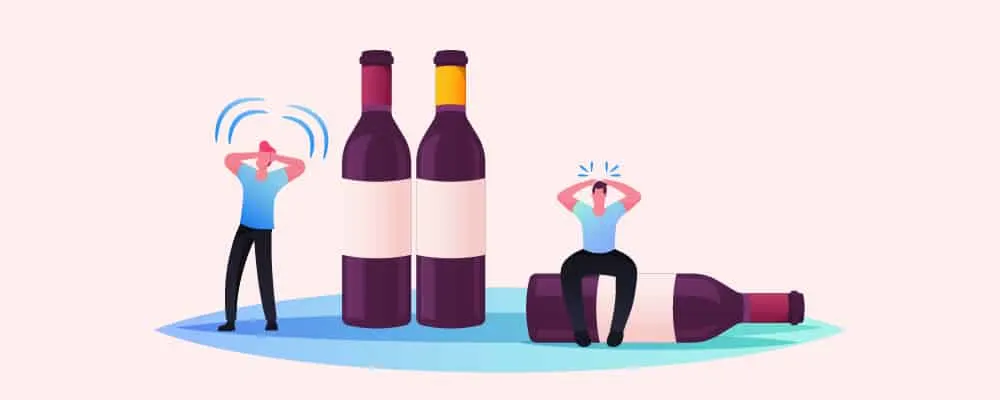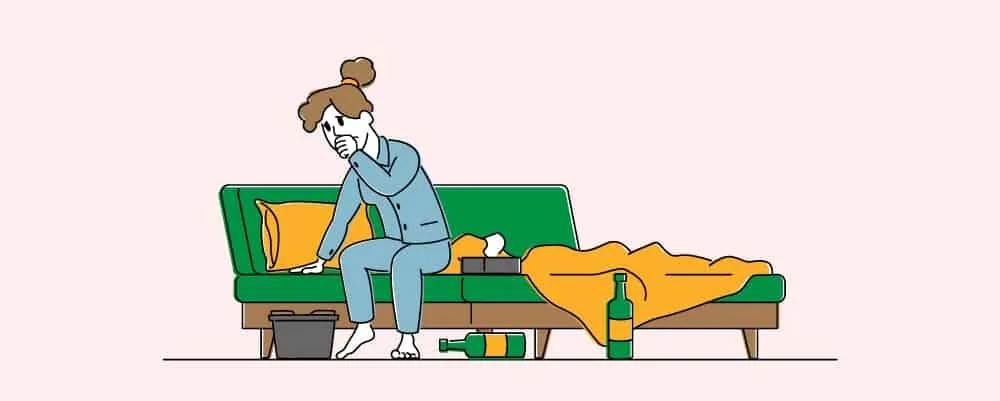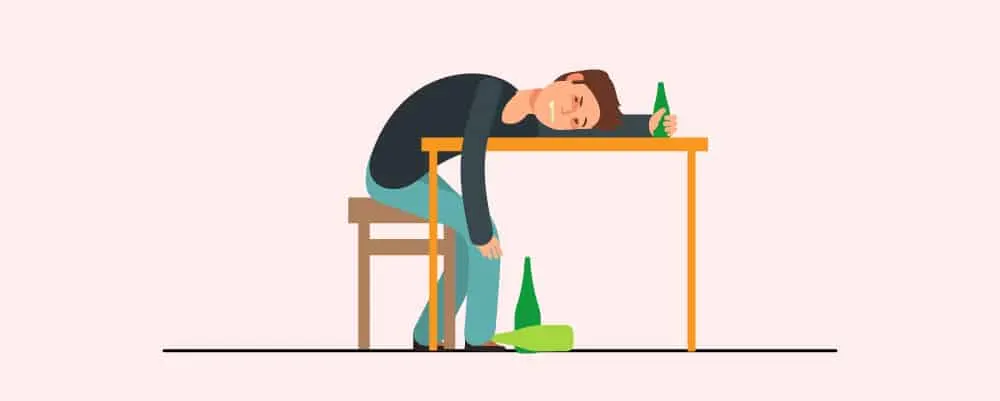A guide on hangovers; why we get them, how to relieve them, and how to prevent them.
Introduction

Most of us who get drunk suffer from a hangover in the morning – this is something everybody learns when they become legal drinkers. If you’re here, you might have a hangover right now. If that’s the case, we’ll try and keep things simple so your head doesn’t hurt so much.
In this guide you’ll find the following information:
- Why Do We Get Hangovers?
- How To Relieve A Hangover
- How To Prevent Hangovers
Those are three pretty distinct sections that should have all of our readers covered.
Looking to learn about how hangovers happen? Then the first section will help you out.
Got a hangover right now? That second section should ease your pain.
Planning a night out and want to be prepared? The last section has the arsenal you need to drink responsibly and survive the next day.
Throughout all of these sections, we’ve also referenced supporting materials. When talking about hangovers, we need to cover some medical and dietary information that’s complex and best explained by the experts. If you’re suffering right now, maybe wait till the hangover is over before looking into these!
How Long Do Hangovers Last?
Before we start this guide, you may be wondering how long your hangover is going to last. Like anything that affects our body, it varies! Here’s a rundown of what influences hangover times:
- Age
- Sex
- Ethnicity
- Body size/stature
- Body fat content
- Liver health
- Current medications
- Current diet
- Any conditions affecting your body’s nutritional balance
Many of these should look familiar – it’s the same criteria that determine whether you’re a “lightweight” or not when handling your drink. These change how fast your body processes alcohol.
So how long does the average hangover last? For most of us, it’ll be 24 hours at maximum. Young drinkers can typically bounce back the next day, only having hangover sickness in the morning and afternoon.
That said, hangover sickness can last for as long as 72 hours. Even if this is the case for you, you can cut this time down by following some of the methods we’ve included below. That’s why you need this guide!
Let’s go deeper into what hangovers are and why we get them.
Why Do We Get Hangovers?

Hangovers happen when we drink too much alcohol. For some, this can be one drink while others can sink a few pints before ruining their tomorrow morning. When you get down to it, hangovers are all about imbalance. By drinking alcohol, you have caused a nutritional imbalance in your body that causes discomfort or, even worse, pain.
Alcohol Consumption Causes Your Body To Produce More Urine
The main imbalance that causes a hangover is dehydration. This is caused by excess urination because alcohol is a diuretic.
Put simply, a diuretic is a substance that makes the water in your body turn into urine at a faster rate, which also reduces the salt content in your body at the same time. Medical diuretics are great for treating certain issues like hypertension or kidney problems but, well, you didn’t have medical diuretics last night, did you?
Alcohol stops your body from releasing the antidiuretic hormone called vasopressin, or ADH while we’re keeping things simple. This makes the kidneys release more water, dehydrating your body and making you pee. This dehydration then causes headaches and nausea.
Learn more about diuretic alcohol.
Alcohol Consumption Irritates The Lining Of Your Stomach
Some of the nausea that you feel during a hangover can also come from stomach irritation. This is something called alcoholic gastritis, or just gastritis for short. The main symptom of gastritis is stomach discomfort and pain but, in serious cases, it’ll also cause vomiting, diarrhea, and bleeding if you drink to excess.
If you have a burning along your neck and in your throat, you may also have acid reflux as a result of your drinking. These symptoms may be worse if you have irritable bowel syndrome or similar conditions that affect the stomach lining.
If you have these symptoms often after drinking, take a look at how you can stop alcohol-related stomach issues.
Alcohol Consumption May Cause Your Blood Sugar To Fall
Alcohol can also tamper with your blood sugar levels, which can cause diabetes and other issues. When you drink a moderate amount of alcohol, your blood sugar levels are likely to rise. A lot of alcoholic drinks have sugar in them, particularly beer and sweet wines that are loaded with carbohydrates. It can also cause you to overeat too, and cause hypertension.
Excessive alcohol consumption over a longer period will have the opposite effect, however. It’ll cause your blood sugar level to drop, potentially into dangerous lows. If you have any form of diabetes then this will cause you problems. If you haven’t got diabetes, well, you might end up with it after excessive alcohol drinking. It’ll also interfere with the effectiveness of insulin and related medications.
Low blood sugar can even cause mood disturbances and personality changes. If it gets too bad, it’s even possible to have seizures that pose a direct threat to your body and mind.
Alcohol Causes Your Blood Vessels To Expand
Along with being a diuretic, alcohol is also a vasodilator. This means that it causes blood vessels to relax and widen. This can actually be a good thing for your body as it allows blood to move more freely through your body. That doesn’t mean alcohol should be treated as a medication, however, we have drugs for that.
Much like its effect on blood sugar, copious amounts of alcohol has the opposite effect by acting as a vasoconstrictor. This is where the blood vessels then shrink, which increases blood pressure and can worsen conditions like migraine headaches or frostbite.
The point is that one glass of wine can be fine but more will cause your blood vessels to constrict.
Alcohol Can Make You Sleepy
Alcohol consumption can make you groggier than usual. This is something you’ve probably noticed if you’ve gotten drunk already. You become sleepy because alcohol depresses the central nervous system, making you drowsy. This sedative effect only lasts a short while, however. When that effect wears off, you’ll then have trouble achieving deep sleep, which is why you wake up a lot in the middle of the night when you’ve been drinking. Not getting a good night’s sleep just makes you even more tired in the morning, too.
How To Relieve A Hangover

So, we’ve covered what hangovers are and how they affect your body, now we should talk about treating them. With the right actions, you can stop a hangover in its tracks and salvage what’s left of your day.
When you go drinking, you should have some of these planned out already to make sure your hangover is as comfortable as possible.
Here are ten ways that you can relieve a hangover once it has already started. Find a breakdown of each one below.
Get Some Sleep
Your body recovers the most during periods of rest and sleep is the best rest you can get. To allow your body to heal and detoxify itself, you can limit the effects of mild to moderate hangovers by simply staying in bed for longer. If you have a busy day ahead of you, just one hour can still make an appreciable difference in your hangover.
This won’t work if your hangover is more serious, however. You’re not going to sleep your way out of a bad hangover by having a lie-in in the morning. Irresponsible drinking will cause even worse hangovers that need some of the below methods instead.
Drink Plenty Of Fluids
This is one you might have heard already, it’s classic advice that everybody hears when they first drink alcohol. You need to drink water in the morning. The sooner you drink water, the sooner your hangover will become more bearable. Since hangovers dehydrate your body, you curtail the problem by adding that hydration back to your body in the form of water.
Keep a glass of water right next to your bed so it can be the first thing you do when waking up. Fill it up throughout the day to remain hydrated. Too much water will make you feel even worse than the alcohol, so take it slow and stay within your limits.
If you’re not a fan of water, you can get specific beverages that market themselves on their ability to rehydrate you. Packed with electrolytes, these hydration replacements should be able to do the job. Some even market themselves as being better than water but there’s no real evidence to back that up, but they do help stave off hangover pains.
Along with water, you can also drink juice for a tastier liquid snack. There are a lot of vitamins packed into the fruits and vegetables that you can turn into juice. Lemon juice with warm water is great for treating nausea too, especially when made with ginger too. Check out some more juice information here.
Avoid Caffeinated Drinks, If Possible
When you wake up in the morning, you may have the temptation to load up on coffee to try and resurrect yourself. That’s understandable but ill-founded.
One cup might be fine but caffeine is also a diuretic, so that’ll dehydrate you too and worsen the symptoms of your hangover. Because of this, many advise that you stay well away from coffee and other caffeine sources during a hangover.
If you must get your caffeine fix, some tea may be better. Tea still has caffeine in it but nowhere near as much as coffee. By having some sweet tea, you get to drink something without making the situation worse. Green tea is the best tea to drink when you have a hangover and you should warm the mixture instead of boiling it.
When you have a caffeinated drink, you should have one glass of water for every beverage you drink. This offsets the dehydration of the caffeine, keeping you on track and allowing you to recover from the hangover faster.
Eat Something
Another piece of advice you may have already heard is this – eat something to get over your hangover faster. If you’re suffering from nausea as a symptom of your hangover, the last thing you’ll want to do is eat some food. If you do, however, then you could be rewarded with a shorter hangover.
You don’t even need to eat much, especially if you’re focusing on foods that are rich in protein and other helpful minerals. Try starting with easy stuff like pieces of bread and then graduate to more demanding foods, now that you know you can keep food down. Your blood sugar levels will also be lifted by the consumption of carbohydrates. There’s a long list of food items that can help you with your hangover.
One of the most notable and counterintuitive is a fried breakfast. The protein found in bacon and eggs can be great for suppressing hangover symptoms and you get a shot of carbs from the whole dish.
If you want a simpler breakfast, certain cereals can be great for soaking up all the negative effects of alcohol. You’ll want fortified cereals, which are made from healthy grains and contain many great nutrients. They’re filled with iron, as well as magnesium, calcium, and several different B vitamins.
Have Some Healthy Snacks During The Day
While you’re eating to get rid of your hangover, you should also choose healthier snacks that are nutritionally valuable. For a lot of us, snacks tend to be nothing but sugar and carbohydrates which aren’t healthy for us. In smaller amounts, sugar and carbohydrates can give you the energy boost you need for the day but eating antioxidants is much better.
When you’re drinking alcohol, your body takes on oxidative stress. This is what creates free radicals, you may have heard of these if you’ve researched antioxidants and their health benefits before.
Here are some great snacks that you can eat to get more antioxidants in your diet:
- Berries, particularly raspberries and blueberries.
- Cherries.
- Carrots.
- Dark chocolate.
- Ginger
- Grapes, the darker the better.
- Green tea.
- Nuts, particularly tree nuts like pecans, chestnuts, and walnuts.
- Pomegranates.
- Spinach.
- Seeds, particularly flax and chia seeds.
Avoid Over-The-Counter Painkillers If Possible
Like with coffee, you may be tempted to reach for painkillers when you start feeling the effects of your hangover. While there are situations where painkillers can be used to combat hangover symptoms, you shouldn’t try using over-the-counter products to get rid of your hangover.
Hold off on the common painkillers like ibuprofen and aspirin. Those familiar with aspirin know that it makes your blood thinner, something that’ll only make your hangover symptoms worse. Ibuprofen can cause internal bleeding in the stomach and other common painkillers can cause harm to your liver and kidneys. When there are easy home remedies like those above, there’s no need to take over-the-counter painkillers.
If you need to take some of these medications for any reason, at least make sure that it’s an NSAID. This stands for Non-Steroidal Anti-Inflammatory Drugs and they are widely used to relieve pain like headaches, colds, arthritis, and other joint pains. Stay away from any drug that contains acetaminophen, they can be much more dangerous to your liver. Tylenol is one of the largest products containing acetaminophen (which is paracetamol, for our international readers).
You can take antacids if they don’t contain any of the above drugs, and these are useful for fighting nausea or indigestion.
Take A Shower
This may be a simple solution but part of the discomfort we feel during hangovers is because our senses are dulled and we feel groggy, and so all we feel are the aches and pains. Taking a shower will not just freshen you up but it’ll also make your senses sharper, allowing you to get your faculties back and make you more focused to take on the rest of the day.
Cooler showers are better for waking you up but these aren’t for everybody. Others swear by changing between cold and hot water to get the wake-up effects of the cool shower and then the more comfortable, cleaning properties of a warm shower. If you do this, don’t change the temperature instantly. This will cause a shock that might cause more damage to you and leave you feeling worse for wear. Instead, slowly transition to make you more comfortable.
Your hangover won’t be gone, in most instances. You’ll need a lot more than some running water to make that go away. Think of this as a great foundation that you can then use to take some of the other actions above, now that you’re wide awake and have more energy.
Drink Ginger Tea To Help The Nausea
We have mentioned above that green tea can be great for hangovers because it has less caffeine and more antioxidants, making for a refreshing drink that battles the free radicals that alcohol can cause. While green tea fights the negative symptoms of a hangover, there are other teas you can try.
Most teas have caffeine, so make sure your chosen brew isn’t likely to act as a diuretic and worsen the hangover’s effects. If your hangover has given you an upset stomach, drinking ginger tea is a good idea. Anything with ginger is good, so if you have a snack containing ginger or even some ginger ale, these can make you feel a little better.
Ginger is yet another handy antioxidant that’s thrown into so many products, including lozenges, capsules, and nutritional shots, so you could take those if you can’t or don’t want to eat or drink something. You should be able to find ginger supplements at your local drug store.
Take Some Vitamins
Having discussed the vitamin content in certain foods above, it’s no surprise that you can also directly take vitamins and minerals to fight against your hangover. Most hangover-friendly foods are beneficial because they’re packed with vitamins. By taking these vitamins alone, you cut out the middleman and avoid the time, effort, and money that’s used to buy and prepare that food. As we said, you should still eat, but taking vitamins can be the shortcut you need.
Which vitamins are the best? Typically, those in the vitamin B family. Here are six:
- Folic Acid
- Vitamin B1 (thiamine)
- Vitamin B2 (riboflavin)
- Vitamin B6 (pyridoxine)
- Vitamin B12 (cobalamin)
Widely available supplement products like Berocca are filled with some of these B vitamins. Another common supplement you can take is Emergen-C but, as the name implies, it’s loaded more with vitamin C. There’s less evidence that vitamin C is useful for fighting hangover symptoms but it’s crucial to your overall health. Of course, a glass of orange juice is a tastier boost of vitamin C.
Go For A Walk And Get Some Fresh Air
Another simple but effective solution is to go for a walk. Exercise is probably the last thing on your mind during a hangover but flexing your metabolism will make your body much more efficient in purging the toxins that cause hangover symptoms. It’s also great for the mind, assuming you can muster the willpower to fall out of bed and get active.
You only need to walk, you don’t need to sweat or pant during your workout to feel the effects, though that would kick your metabolism into overdrive. A brisk walk will do, it’s something that gets you fresh air and gets the blood pumping through your body. Don’t push yourself too hard if the hangover is that bad and take breaks to regain your breath if you feel nauseous.
How To Prevent Hangovers

You don’t need to be neck-deep in a hangover to start fighting against it. Responsible drinkers should have a plan and take precautions before drinking, which lessens or even outright stops you from having a hangover in the morning.
Here are five methods that you can adopt when drinking to minimize your hangover.
Have Something To Eat Before You Drink
This is one that many of us know. The emptier the stomach, the faster and harder the alcohol is going to hit you. This means you get drunk much faster, which may be less expensive but can also cut your night of drinking short. Once you are drunk, you’ll then feel much worse in the morning and you’ll be more prone to stomach issues like nausea.
Eating food before drinking helps because it dilutes the alcohol in your stomach. This increases the time it takes for that alcohol to enter your bloodstream, which is why it takes longer for the alcohol to take effect. This slower rate of intoxication keeps you more cogent so you can enjoy your night out, and then you’ll be healthier in the morning.
Pick Your Alcohols Wisely
Alcoholic drinks aren’t made equal, so your choice of what you’re drinking determines how bad the hangover will be afterward if you get one at all. First, you should drink in moderation. The painfulness of your hangover directly corresponds with how much you’ve had to drink, so don’t drink so much and you won’t have a hangover that’s so bad. Take a look at the alcohol content of the drinks you have and try to keep within the CDC’s recommended intake.
When choosing alcohol, you’ll typically have a lighter hangover if you drink lightly colored or clear drinks as opposed to dark-colored ones. Drinks that have dark colors are loaded with congeners, chemicals that dictate the taste and aroma of most distilled alcohols. Most alcoholic drinks have congeners but whiskeys, rums, red wines, and brandies have more. These directly translate into a worse hangover the following morning.
Examples of drinks that are low in congeners are regular beers, gins, or vodkas. Some people get bad hangovers from vodkas too, hence why they are often referred to as Vodka Hangovers.
Lastly, you should avoid mixing your alcoholic drinks too much. By mixing drinks, it’s more difficult to keep track of how many drinks you’ve consumed and this can cause you to overindulge. In some circles, it is claimed that mixing drinks will also make your hangover worse. There are many theories as to how but there is evidence both for and against this phenomenon.
Drink Water In-Between
One of the foremost ways to combat a hangover is to hydrate yourself, so you can recover from the dehydrating effects of alcohol consumption. If you keep hydrated throughout your night of drinking then you can get ahead of the hangover, limiting its symptoms or stopping it from happening entirely.
Drink at establishments that offer water so you can sip on them in-between your alcoholic beverages. If you drink enough, you’ll still be mostly hydrated in the morning. You should still drink some more water when you get up but you should be clear of headaches and other uncomfortable hangover symptoms.
Know Your Limits And Stick To Them
Since the severity of the hangover depends on how much you’ve had to drink, the surest way to prevent a hangover is to know your limits. Know how much drink you can take during a drinking session and don’t exceed that limit. The limit depends on many of those factors we mentioned in our introduction, and you can find more information about alcohol limits here.
Set your limit, maybe even have an agreed limit amongst your friends to keep each other accountable, and then keep that in mind when you’re drinking. If you’re the forgetful type, you can use a physical note or a notepad application on your smartphone to keep track of your limit and how many drinks you’ve had. If you do mix alcoholic beverages, remember to keep track of those too.
This is an exercise in willpower, you need to stick to this limit instead of overindulging in alcohol. This may sound simple enough but in social situations, you may be peer pressured into drinking more alcohol than you should, so learn to say no when you’re at your limit.
Drink Slowly
Eating a square meal can help you handle alcohol because it makes the alcohol enter your system more slowly. You can use this logic when drinking too by slowing down your consumption rate of alcohol.
Don’t slam down multiple tequila shots in quick succession, that’s going to cause you all sorts of issues in the next morning. Don’t mix multiple drinks at once too, that’ll maximize your alcohol intake in a shockingly short amount of time. Ideally, you’d drink one alcoholic drink an hour to stay within a controllable consumption rate until you’re close to your limit.
Summary

With that, we’ve reached the end of our ultimate guide on curing and preventing hangovers. If you stuck around for the whole thing, you should have learned what hangovers are and how they affect our bodies, how you can cure hangovers when you’re going through one, and then how you can prevent hangovers before you even touch a drop of alcohol. For most casual drinkers, this is more than enough to keep you healthy and functional after you indulge in alcohol.
There’s a lot here to remember, so it may be a good idea to check back with us when you’re planning to drink, or when you’re already hungover. Having this guide bookmarked could be your secret weapon for dealing with the next hangover. If you take the precautions above before you drink, you can even stop a hangover completely.
No matter what your strategy is for dealing with hangovers, what’s important is that you take care of your health and drink responsibly. If you’re fighting hangovers more often than not, consider the possibility that you may have an unhealthy relationship with alcohol that needs to be addressed. You can do this by confiding in those who have your best interests at heart and seeking professionals’ help.
